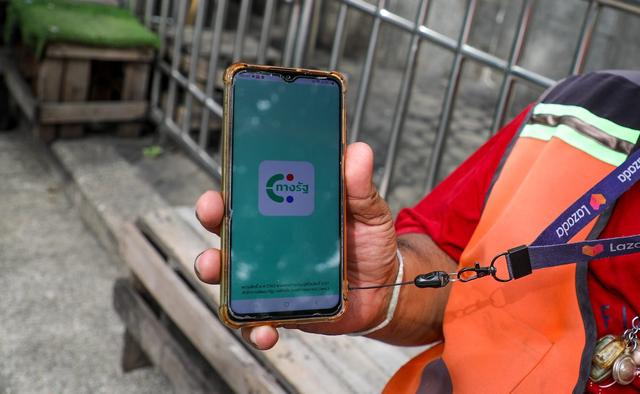Thai PBS Verify has discovered a fake Facebook page called “กรมจัดหางานใน ตปท” (Department of Employment Overseas) running ads on Facebook for job opportunities in “Kitchen / Agriculture-Farming / Factories in Australia.” However, upon investigation, it was discovered that the page name was impersonating a government agency and using images from other sources to falsely claim authenticity.
Source: Facebook

Verification process
Upon investigation, it was found that the Facebook page named “กรมจัดหางานใน ตปท” posted an ad stating, “Kitchen / Agriculture-farm / Factory workers in Australia, limited slots available.” The advertisement featured images claiming to recruit workers for overseas jobs (Australia) in kitchens, farms, and factories, with legal work visas. The ad attracted over 2,300 reactions and hundreds of inquiries from people interested in the job opportunities.

Fake Job Page Impersonating a Government Agency
Upon checking the page, it was found that the page introduced itself as a consultant. The location listed was Department of Employment, Ministry of Labour, Bangkok, Thailand. Upon reviewing the page’s transparency details, it was discovered that the page was created on June 4, 2024, but the name was changed from “Shop store” to “กรมจัดหางานใน ตปท” on December 14, 2024.

Misused Images to Fake Credibility
Further investigation using Google Lens revealed that the images posted on the Facebook page “กรมจัดหางานใน ตปท” were taken from a YouTube channel belonging to a recruitment company that sends workers to Taiwan.
These images were misused to create a false sense of credibility, even though the company has no connection to job recruitment in Australia.

Similarly, the page’s cover photo was found to be taken from the official Department of Employment Facebook page.

Attempt to Contact the Page
We also attempted to contact the page for further details about the job application. The response we received was: “The quota is limited. If you’d like to inquire further, please contact our staff via by clicking the LINE link. Add us on the LINE application to have the staff explain the details to you. If there’s anything you don’t understand, feel free to ask the staff. You can also add us on the LINE application to inquire for more information.”


However, when we requested the information to be sent via message as before, the page responded with: “This is to prevent scammers” As a result, we were unable to obtain any details about working abroad from the page.

There have been numerous reports in the past regarding fake pages scamming job seekers with promises of employment abroad, particularly in Australia. Cases similar to this have been covered multiple times, such as here and here.
What are the impacts of this false information?
This post has attracted significant interest, with over 2,300 likes and more than 100 comments from users inquiring about job details.
Most of those who reached out were primarily interested in the cost of traveling abroad for work, demonstrating the high demand and vulnerability of job seekers looking for employment opportunities outside Thailand.

The latest case of foreign employment fraud involved 250 Thai workers who had packed their belongings in preparation for an agricultural job in Australia on the night of January 4. However, upon arrival, they discovered that there were no plane tickets and no travel arrangements.
As a result, all affected workers filed a complaint with the Suvarnabhumi Airport Police Station (Suvarnabhumi Airport Police Division). Most of the victims were laborers from northeastern Thailand, including Buriram, Nakhon Ratchasima, and Sakon Nakhon. They had been deceived into believing they would secure jobs in Israel and Australia.
It was found that each worker had to pay a fee ranging from 30,000 to 60,000 baht or even up to 100,000–150,000 baht, resulting in total damages of over 12 million baht.

Inquiry Confirms Fake Facebook Page Impersonating Government Agency
We also conducted an inquiry with the Department of Employment, Ministry of Labor, which has been falsely represented by a Facebook page under the name “กรมจัดหางานใน ตปท” (Overseas Employment Department).
Mr. Somchai Morakotsriwan, Director-General of the Department of Employment, confirmed that this page is not affiliated with the department, either at the central or regional level. The page has fraudulently used the department’s logo and name on its website without authorization.
If you come across such a page, do not believe it, as it may attempt to collect personal information for malicious purposes or scam job seekers, leading to financial and other damages.

The Department of Employment, Ministry of Labour, would like to inform Thai workers who plan to travel abroad for work to do so using the proper legal methods. There are five legal ways to travel for work: Recruitment by a licensed recruitment agency, recruitment by the Department of Employment, traveling for work independently, employers in Thailand sending employees to work abroad and employers in Thailand sending employees for training abroad.
It is emphasized that currently, there is no program sending Thai workers to Australia, neither by the government nor by registered recruitment agencies. This is because individuals who wish to work in Australia must meet the required standards, including language tests and professional skill assessments, which are of a high level. Workers traveling abroad must report their travel every time.
Meanwhile, for Israel, the current process involves government-to-government recruitment for agricultural jobs, while construction jobs are arranged through private-to-private recruitment, but only with authorization from the Department of Employment.
Guidelines for Overseas Job Advertisements
For overseas job advertisements, regardless of the medium used, only recruitment agencies authorized by the Department of Employment are permitted to advertise. These agencies must notify the local registrar, where their office is located, at least three days before publishing the advertisement. Additionally, the advertisement must not run for more than 30 days from the date of publication.

Regarding advertisements for job placements to work abroad, the advertisement must clearly specify the job positions, the number of vacancies, the duration of employment, the name of the employer, the country, the name of the recruitment agency, and the work permit license number, in accordance with the Ministry of Labour’s regulations on job recruitment advertisements B.E. 2561 (2018) and its amendments (No. 2) B.E. 2564 (2021).
Interested individuals who wish to work abroad are advised to thoroughly verify the information of recruitment agencies to prevent being deceived by fraudsters. For more information, you can contact the Provincial Employment Offices, the Bangkok Employment Office, the Central Job Registration and Employment Protection Division at 02-248-4792, the Department of Employment’s hotline at 1694, or the Ministry of Labour’s hotline at 1506, press 2 for the Department of Employment, or the Department of Employment’s hotline at 1694.
Fraudsters Exploit the Weakness of “Insufficient Domestic Compensation”
Mr. Chalee Loysoong, an advisor to the Thai Labour Solidarity Committee (CTW), commented on the issue of the demand for Thai workers to work abroad. The desire to work abroad has been a long-standing cultural norm for Thai workers. Many workers prefer working overseas, even if it requires substantial costs or upfront fees. These workers are willing to incur debt for the chance to earn a higher income, which is often seen as a route for fraudsters to exploit.

The issue of being deceived into working abroad highlights the living conditions in the country, especially the wages, which are still insufficient to meet the needs of the workforce. This situation drives workers to do anything they can to earn a higher wage. If wages within the country could be raised to a level comparable to those abroad, it’s believed that no worker would want to leave Thailand. Working abroad is not necessarily a comfortable life. From personal experience visiting workers abroad, it’s evident that the work there is harder than in Thailand, but when it comes to compensation, they are paid significantly more. Additionally, there is the social aspect of being able to boast about working abroad, which adds prestige in society.
Working abroad is not much different from working in Thailand, and in some cases, the work is even more physically demanding and dangerous.
In the past, scammers typically deceived small groups of 20-30 people, but now there are reports of them deceiving large groups of hundreds of workers. This indicates that scammers are targeting much larger amounts of money in one go, aiming to make their operation more profitable. This has caused significant harm to vulnerable groups, especially workers at the grassroots level. The money required to travel abroad is often not cheap, with amounts ranging from tens of thousands to even hundreds of thousands of baht. The funds that are deceived are usually loans taken out with the hope of working abroad. If the workers do eventually go, it takes several months to pay off their debts.
Therefore, it is essential for the government to implement measures to address or prevent such incidents and not view it as a private matter of deception. These workers are citizens of Thailand, and when they work abroad, they send money back to help develop the country.





